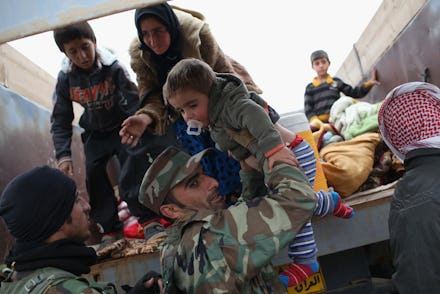If the Paris Attacks Make You Hate Muslim Refugees, ISIS Wins

We're less than four days removed from the deadliest terrorist attack in France since World War II, and Republican presidential candidates in the United States have already seized the moment to target Syrian refugees and disparage Muslims with xenophobic rhetoric.
On Monday, Donald Trump told MSNBC he would "strongly consider" shutting down and beefing up surveillance at mosques. Former Arkansas Gov. Mike Huckabee, responding to a question about Syria, said it's time for America to "wake up and smell the falafel" and also said House Speaker Paul Ryan should resign if he does not reject Syrian refugees. Meanwhile, former Florida Gov. Jeb Bush told CNN the U.S. should aid only the "Christians that are being slaughtered," while Texas Sen. Ted Cruz said Muslim refugees should be turned away in favor of Syrian Christians, because there "is no meaningful risk of Christians committing acts of terror."
All this comes as governors across the country — all but one of whom is a Republican — have come out against accepting Syrian refugees in their states.
While there are plenty of moral arguments for why this response is misguided, here's what's most troubling about this bellicose anti-immigrant rhetoric: This is exactly the type of response ISIS hoped to provoke by killing 129 people in Paris.
Here's the problem: ISIS needs to recruit large numbers of foreign fighters from across the world to replenish their ranks, which have been depleted as U.S.-led airstrikes in Syria and Iraq have killed thousands of fighters. They are particularly interested in radicalizing young Muslims citizens in European countries, who can travel to ISIS territory for training and return relatively easily to their home countries. (All of the identified suspects in the Paris attacks are European citizens.)
Once they return to their home countries, they can launch attacks and the cycle begins anew.
The first step in recruiting new members is radicalizing young Muslims where they already live. The way ISIS does this is by framing their fight as a battle between the West and all Muslims. Here's what counterterrorism analyst Harleen Gambhir wrote in the Washington Post:
"The Islamic State explained after the January attacks on Charlie Hebdo magazine that such attacks 'compel the Crusaders to actively destroy the grayzone themselves ... Muslims in the West will quickly find themselves between one of two choices, they either apostatize ... or they [emigrate] to the Islamic State and thereby escape persecution from the Crusader governments and citizens.' The group calculates that a small number of attackers can profoundly shift the way that European society views its 44 million Muslim members and, as a result, the way European Muslims view themselves. Through this provocation, it seeks to set conditions for an apocalyptic war with the West."
Painting all Muslims with the terrorist brush, then, plays directly into ISIS' recruitment strategy. Rather than using this moment to spark an important debate over the U.S. strategy for defeating ISIS, many are using the Paris attacks to stigmatize refugees, thereby reinforcing ISIS' apocalyptic narrative and further isolating young Muslims in the West.
So while this kind of bellicose rhetoric may play well in places like Iowa — where polling shows 30% of voters actually think Islam should be illegal — ISIS thrives off of this kind of Islamophobia, a point eloquently summed up by the Atlantic's Jeffrey Goldberg:
Lessons from 9/11: If America learned anything from 9/11, it should be the folly of jumping to respond to the Paris attack without fully understanding the context or appreciating the consequences.
"[ISIS] will be heartened by every sign of overreaction, of division, of fear, of racism, of xenophobia; they will be drawn to any examples of ugliness on social media," Nicolas Henin, a French citizen who spent 10 months as an ISIS captive in Syria, wrote in the Guardian. "Central to their world view is the belief that communities cannot live together with Muslims, and every day their antennae will be tuned towards finding supporting evidence."
Unfortunately, politicians are giving them that fodder. Rather than displaying restraint and tolerance, they are resorting to tempting clash-of-the-civilizations rhetoric which can only serve to exacerbate the wedge between the U.S. and Muslim world.
That's exactly what ISIS hoped we would do.